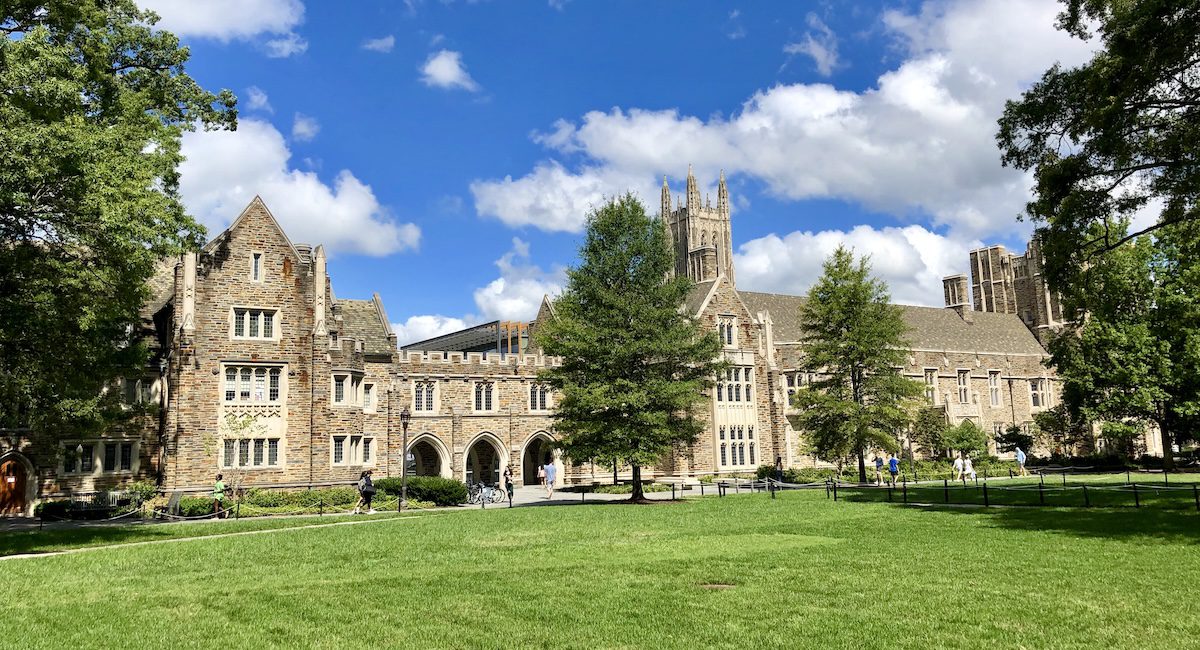IvyWise On-Demand: Duke University: How to Get in and What to Know
Are you considering applying to Duke University? Whether you are beginning the college search process or finalizing your list, this is a great opportunity to learn all about Duke and hear expert tips on how to get in from IvyWise college admissions counselors Alecia, former Assistant Director of Admissions at Duke, and Mike, former Assistant Director of Admissions at Stanford.
Watch Now
Located in Durham, North Carolina, Duke University is a private research institution with a sprawling, 8,000-acre campus that blends Gothic architecture with a stunning landscape. Founded in 1838, Duke has built its reputation on rigorous academics, cutting-edge research, and a strong athletic program — especially its men’s basketball team.
Often regarded as a “Southern Ivy,” which makes admission highly competitive, Duke attracts talented students from across the U.S. and around the globe. If you aspire to become a Blue Devil, it’s essential to understand what Duke looks for in applicants so you can position yourself for success.
How to Get into Duke: Table of Contents
- When to Apply to Duke
- How Hard Is It to Get into Duke: Early Prep
- How Do You Actually Get into Duke: The Application
- Class Profile
- What Makes Duke Unique?
- Duke University FAQs
When to Apply to Duke
Applying to Duke requires an application strategy, since you have two timelines to consider. Which timeline you choose depends on whether Duke is your top choice.
Duke Deadlines
Duke offers one Early Decision round in addition to the Regular Decision round. Deadlines may fluctuate slightly each year. For fall 2026 admission, the deadlines are:
- Early Decision: November 3, 2025
- Regular Decision: January 5, 2026
Students applying ED should expect a decision in mid-December. RD students will receive a decision in late March or early April.
Early, Rolling, and Regular Decision
It’s typical in college admissions to see various application options, such as Early Decision, Early Action, Regular Decision, and rolling admissions. Each school varies on which of these options they offer. At Duke, students can only apply Early Decision or Regular Decision.
- Early Decision: This is ideal for students who already have a competitive academic and extracurricular profile as they enter senior year. This is a binding option — you should only apply ED if Duke is your first choice and you are committed to enrolling if accepted, which is why you can only apply ED to one school. ED students apply early and receive their decision early.
- Regular Decision: This is the round with the largest applicant pool, as it’s the standard admissions timeline. RD is non-binding, so there is no commitment to attend if you’re accepted.
Duke does not offer Early Action or rolling admission, but it’s important to know what these are since you will likely see them at other schools on your list. Early Action is like Early Decision in every way except that it is not a binding commitment — if you are accepted EA, you can still choose to enroll elsewhere.
Finally, rolling admissions is when students are accepted on a rolling basis until the class is full. With a rolling admissions school, you don’t have a specific deadline, but you should still submit your application materials early to ensure there is room for you in the incoming class.
Waitlisted Applications
In the Regular Decision round, admissions committees will release three possible decisions: accepted, denied, or waitlisted. If you are waitlisted, you can choose to accept or decline your spot on the waitlist. If you accept your spot, it’s important to understand that waitlist admission rates at highly selective schools like Duke tend to be extremely low. It’s worth considering enrolling at another school that admitted you.
Deferrals
When Early Decision notifications are released in mid-December, applicants will learn if they are admitted, deferred, or denied. If you receive a deferral, that means your application will be re-evaluated in the Regular Decision round. In the meantime, you may wonder what to do if you have been deferred.
It’s important to continue working on your Regular Decision applications, but you can also send a Letter of Continued Interest (LOCI) to Duke to inform them of any important academic or extracurricular achievements since you applied and reaffirm your interest in attending.
How Hard Is It to Get into Duke: Early Prep
Getting into Duke University is a highly competitive process that requires careful planning and preparation. These admission rates from the past four years show that Duke is a reach school for everyone.
- Class of 2026: 6.20%
- Class of 2027: 6.78%
- Class of 2028: 5.71%
- Class of 2029: 4.80%
The admissions committee will look at all four years of academics and extracurriculars in high school, so it’s crucial to get an early start on developing yourself to be the ideal applicant.
Build Your Profile
So, what does Duke look for as they’re reviewing applications? In their own words, “We like ambition and curiosity, talent and persistence, energy and humanity.” Like most U.S. colleges and universities, Duke reviews applicants holistically. Your academic performance and level of rigor in high school are important, but so are the extracurriculars you’re involved in, letters of recommendation, and your application essays.
Take the most advanced courses offered by your high school and aim to achieve the best grades you can. Cultivate good teacher relationships so they will be happy to write letters of recommendation for you. Find extracurriculars that are meaningful to you that align with your interests, and deepen your involvement in them over time by finding ways to build your leadership skills and make a true impact. If you do all these things, you will build a strong profile for college admissions.
Visit the Campus
If you want to apply to Duke, the best way to know if it’s a great fit for you is to go to Durham for a campus visit. Duke Undergraduate Admissions offers a variety of on-campus programming for prospective students, including tours and more immersive experiences. If you can’t make it to Durham, Duke goes on the road to speak to prospective students. You can check their website to see if they are coming to your area.
Duke also offers virtual programming, such as information sessions, campus tours, Blue Devil chats, community panels, and more. Whether you can visit campus in-person or not, participating in some of Duke’s virtual programming can be very valuable.
Connect with a Student
You have several opportunities to connect with students during admissions events. You can register for a student-led campus tour. The virtual Blue Devil chats and community panels also give you a chance to connect with current students.
Learn About Any Student Experiences
Take advantage of the admissions events to ask students questions about their experience at Duke. You can also learn more about the campus life by reading “The Chronicle,” Duke’s student-run newspaper — the “How to Duke” section can be especially helpful. Also look for Duke students on social media to get a glimpse into their lives.
How Do You Actually Get into Duke: The Application
Duke accepts the Common Application and QuestBridge Application for first-year applicants. In addition to the application, you will be asked to submit additional required materials, including transcripts, recommendation letters, and essays. You can also submit optional materials to enhance your application.
GPA Requirements
While Duke does not require a specific GPA for admission, they do rank academic GPA as “very important” on their Common Data Set. They do not disclose the high school GPA of enrolled first-year students; however, they do provide data on class rank. Out of the class of 2028 students who submitted their class rank, 92% graduated in the top 10% of their high school class. From this, you can conclude that you need a stellar GPA to gain admission.
SAT and ACT Scores
Duke is test-optional for the 2025-26 admissions cycle. However, you should consider submitting test scores if they will make your application stronger. You can look at the Common Data Set or class profile to get the test score data. For Duke’s class of 2029, the middle 50% range for accepted students was 1500-1570 for the SAT and 34-35 for the ACT. If your scores fall within or above this range, we highly recommend submitting them.
The admissions committee will consider the highest score you achieved on each section across multiple test sittings, but they do not superscore. For the ACT, they will also consider your highest composite score.
Personal Statement
The personal statement you submit to Duke will be your response to one of the Common App essay prompts. This is the essay that will go to every school you apply to through the Common App, so choose the prompt that resonates the most with you. Duke wants to know who you are as a person, so it’s important to be authentic in your personal statement and express your own voice.
Essays
In addition to your personal statement, you are required to respond to the following supplemental essay prompt in 250 words or less:
What is your impression of Duke as a university and community, and why do you believe it is a good match for your goals, values, and interests? If there is something specific that attracts you to our academic offerings in Trinity College of Arts and Sciences or the Pratt School of Engineering, or to our co-curricular opportunities, feel free to include that, too.
This is the standard “Why this college?” prompt — be as specific as possible about what draws you to Duke and what you’re looking forward to in terms of classes, professors, research opportunities, and clubs or organizations you wish to join.
Additionally, you can choose to respond to one of four optional prompts in 250 words or less if you feel it adds something new and meaningful to your application.
- We believe a wide range of viewpoints and experiences is essential to maintaining Duke’s vibrant living and learning community. Please share anything in this context that might help us better understand you and your potential contributions to Duke.
- Meaningful dialogue often involves respectful disagreement. Provide an example of a difference of opinion you’ve had with someone you care about. What did you learn from it?
- What’s the last thing that you’ve been really excited about?
- Duke recently launched an initiative “to bring together Duke experts across all disciplines who are advancing artificial intelligence (AI) research, addressing the most pressing ethical challenges posed by AI, and shaping the future of AI in the classroom” (duke.edu). Tell us about a situation when you would or would not choose to use AI (when possible and permitted). What shapes your thinking?
Letters of Recommendation
Three recommendation letters are required with your application. One should be from your school counselor. The other two should be from teachers who have taught you in core courses, preferably in your junior or senior year. One of the recommendations should come from a math or science teacher if you are applying to the Pratt School of Engineering.
You can also submit a personal recommendation, though this is optional. This can be from an employer, mentor, or someone else who can speak to your character.
Admission Interviews
Because of the large number of applications received each year, Duke is unable to interview every applicant. Some students may be invited to an interview with an alumni volunteer after submitting their application, but not receiving an invitation will not impact your chances of admission. Instead, students can submit a 60-90 minute college application video via Glimpse, but this is not a requirement.
Contribution to the Duke Community
Just as it’s important for you to choose a best-fit college, it’s important for Duke to choose students that are the best fit for them. The admissions committee wants to get a good idea from your application of how well you will fit into the campus community and what contributions you will make. Ensure your application shows how you align with the university’s values and what they look for in their students.
Class Profile
Understanding Duke’s admissions statistics and class profile can help you better position yourself as a competitive applicant. Let’s look at the data for the class of 2029. Out of the 51,795 applicants for fall 2024 admissions, Duke accepted only 2,957.
What Makes Duke Unique?
Duke University offers a distinctive blend of academic excellence, fun traditions, and cutting-edge resources that make it an exceptional place to study and live. Its campus is considered one of the most beautiful in the U.S., creating an inspiring environment for intellectual and personal growth.
A global leader in interdisciplinary research, Duke boasts state-of-the-art facilities such as the Shared Materials Instrumentation Facility (SMiF) for nanotechnology, the Duke Lemur Center for primate research, and the Duke Marine Lab for ocean studies. Duke’s massive campus is largely made up of the Duke Forest, 7,100 acres of forest and open fields that have been used for teaching and research for nearly 100 years.
The Duke University Libraries system holds nearly 9 million volumes and includes the Perkins and Bostock Libraries, the Rubenstein Rare Book & Manuscript Library, and the Music Library. These spaces offer everything from digitized archives to modern study hubs. For art and culture enthusiasts, the Nasher Museum of Art hosts world-class exhibitions, while the Duke Chapel stands as an iconic landmark and cultural hub.
Blue Devils basketball is central to campus life — students camp out in Krzyzewskiville (K-ville), a temporary tent city, for several weeks to secure seats at Cameron Indoor Stadium, joining the legendary Cameron Crazies during games. Another tradition includes bench burning after major victories, especially against Duke’s main rival, the University of North Carolina at Chapel Hill.
Duke is ideal for students who are ambitious, collaborative, and eager to make an impact through academics, research, and service. If you value rigorous coursework, global engagement, and a campus that balances tradition with innovation, Duke offers an environment where you can thrive.
Duke University FAQs
What are Duke’s application deadlines?
For the 2025-26 admissions cycle, the Early Decision deadline is November 3, 2025. The Regular Decision deadline is January 5, 2026.
Does Duke require SAT or ACT scores?
Duke is test-optional through the 2025-26 admissions cycle.
What is the minimum GPA requirement for Duke?
There is no minimum GPA requirement; however, since Duke’s admission rate for fall 2025 was under 5%, you can assume that you need a high GPA to be accepted.
Does Duke require admissions interviews?
Interviews are optional and conducted by alumni volunteers when available. Not all applicants will be invited to interview. Instead, Duke invites applicants to submit a 60-90 second video on the Glimpse platform.
How many recommendation letters are required?
Duke requires two teacher recommendations and one counselor recommendation.
Is on-campus housing required?
Students are required to live on campus for three years.
Admission Counseling
Because Duke University is a reach school for all students, it can be beneficial to seek guidance from an experienced admissions counselor. The college admissions process is constantly evolving, and being able to navigate the requirements and expectations with confidence is crucial for success.
Every college admissions counselor at IvyWise has at least three years of experience as an admissions officer at a highly selective college and university. Having read thousands of applications, they know exactly what makes students stand out. Our proven methodology ensures that students maximize their chances of admission to even the most selective schools. Get started today by scheduling an Initial Consultation.
Contact Us




